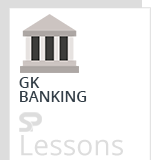Banking concepts are associated with banking and finance. The below terminologies are commonly asked in bank interviews and are frequently used in day- day banking related tasks as a PO/Clerk.
Money Laundering means acquiring, owning, possessing or transferring any proceeds of money of crime. Black Money in short!
Hybrid Debt-Capital instruments:
Capital Market instruments that combine certain characteristics of equity and some of debt; any instrument which combines the qualities of 2 or more traditional instruments will be referred to as a ‘hybrid’.
Pillars of Basel:
(i) Minimum Capital Standards
(ii) Supervisory Review
(iii) Market Discipline (Imp to know from interview point of view too.)
Financial Literacy:
Financial Literacy or financial education stands for being knowledgeable about and to be able to effectively make use of financial resources, such as banking /investing etc
Narrow Banking:
Narrow Banking is a particular system of banking, in which a bank places its funds in risk free assets (ex.: govt. securities), with maturity period matching its liability’s (when the bank has to pay back to the customer) maturity timing – this helps to maintain proper liquidity at the time of demand payment and their funds have no chance of becoming an NPA.
So, narrow banking is like narrow mindedness and to play it safe!
Venture Capital:
Venture Capital is a source of fund, so, venture capital is the capital or source of fund which is used for financing new business ideas, which involves new technologies, high risk and potential high returns!
Index Linked Bonds:
Index Linked Bonds is the kind of bonds, the redemption value of which increases or decreases according to the movements in the rate of inflation. Wholesale Price Index is used as the inflation measure.
Z-Group shares:
Shares of those companies which do not adhere (follow) the SEBI’s listing agreements.
Casino Banking:
No Banks are not running casinos!
AIR:
Annual Information Return. This return is to be filed by banks with the income tax department; this return helps the Tax authorities to look into transactions of tax payers.
IPO:
Initial Public Offer – when a listed company offers its shares to the public for subscription for the first time.
Listed Company:
Listed Company is any company listed with SEBI; Securities Exchange Board of India, which is a regulatory body for companies and their dealings with the public in the share market.
DEMAT or Dematerialization:
DEMAT or Dematerialization is the process of converting the physical share certificates into equivalent number of electronic holdings in the ‘Demat Account’ of the investor.
Blue Chip companies/stocks:
Blue Chip companies/stocks are those companies and the stocks/shares of those companies which are very highly priced as they have very high earning capacities. Blue chip companies are high profit making companies which are expected to maintain their profitable performance in near future.
Bear/ Bear Market:
When you say that an investor is expecting a bearish market, it means, that he expects the prices of stocks in the share/capital market to fall.
Bull/ Bullish Market:
When an investor expect the prices to rise in the capital market.
Dawn Raiding:
Dawn Raiding refers to buying of huge amount of shares immediately after the stock market open!
Gilt edged securities:
Gilt edged securities are referred to those securities which are issued by the Government
Jobber:
Jobber is a member broker of a stock exchange who only deals in buying and selling of securities from and to other fellow brokers. He does not deal with the public.
Kerb dealing:
Kerb dealing is the trading transactions done between members after official closing of the trading hours.
Insider trading:
Insider trading is when a person who has ‘privileged information’ or the ‘inside information’ of a company and its business- and uses this information to make transactions in the capital market to make huge personal profits. It is illegal!
Spot trading:
Spot trading is when shares are bought and taken delivery of and paid for.
Derivatives Market:
where the value of the instruments bought and sold is based on value of the underlying asset. The value of the instrument is ‘derived’ from the value of the underlying asset and hence it is known as Derivatives. Derivatives Market is where trading in derivative instruments take place.
Speculation:
Speculation is when a person, known as the speculator, tries to make money on the difference in prices of stocks, by purchasing at lower price and selling at higher price.
Price Rigging:
Where a person or a group of persons having knowledge expert knowledge of the working of a capital market – artificially increases or decreases prices of securities of a company to make money by cheating the investors. It can also be called as market manipulation
Cum-dividend/rights/bonus :
Cum-dividend/rights/bonus means that the share which the investor is buying comes with rights to dividend, or special rights attached with the shares or to bonus shares issued by the company to which the shares belong.
Ex-dividend/rights/bonus :
Ex-dividend/rights/bonus means that the shares that an investor is buying does not have any right to dividend/bonus/special rights issued by the company.
Bottom Fisher:
Bottom Fisher is an investor, who looks to buy those share, the price of which has recently fallen to a great extent.
Panic Buying:
When investors buy large number of shares during price rise, thinking that the prices will keep rising!
Caveat Emptor:
Caveat Emptor means, ‘Let the Buyer Beware’. Which means the buyer, in our case the Investor needs to be knowledgeable about what he is doing and to be careful in his dealings.
 Introduction
Introduction  A
A  B
B  C
C  D
D  F
F  H
H  I
I  L
L  M
M  N
N  P
P  R
R  S
S  U
U  V
V  Interviews
Interviews 


